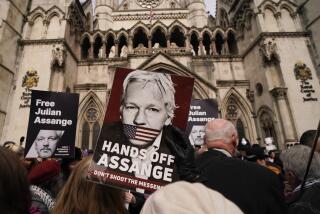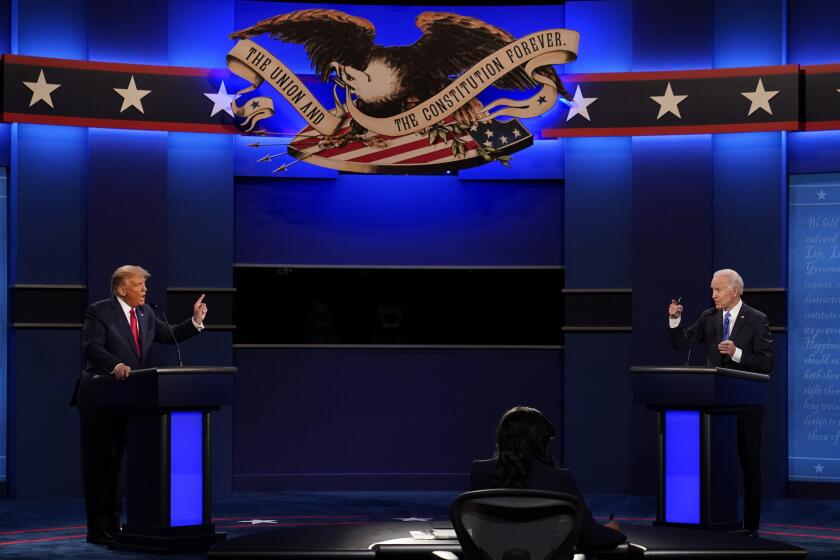Ashcroft Remarks Violated Rules, Hanssen Lawyers Say
Attorneys for accused spy Robert Philip Hanssen charged Wednesday that Atty. Gen. John Ashcroft violated the Justice Department’s own guidelines by publicly threatening to consider the death penalty against the former FBI agent to coerce a plea bargain.
Justice Department guidelines ban the government from using the death penalty to leverage its position in plea negotiations. Yet defense attorney Plato Cacheris said in a letter to the department Wednesday that Ashcroft did exactly that earlier in the week.
Ashcroft, asked at a news conference about the prospect of seeking the death penalty against Hanssen, told reporters Tuesday that he would have to assess whether guarding national interests demands “the ultimate penalty” in such a case.
“There is a national interest in making sure that we send a signal, that we take very seriously any compromises of the national interest and the national security by individuals who would inappropriately leak information or sell information,” Ashcroft said.
He added that such factors should be considered “in the context of a plea bargain.”
That the Justice Department was considering seeking the death penalty against Hanssen was not news. Department prosecutors already had noted in a court filing earlier this month that Hanssen would face either life in prison or the death penalty if convicted on charges that he gave the Russians secret intelligence data in exchange for $1.4 million in cash and diamonds.
But it was unusual for the attorney general to comment so publicly on the sensitive issue, just moments after he noted that his predecessor, Janet Reno, had warned him when he took office in February not to discuss any specific cases with the media.
Justice Department officials said that Ashcroft intended his comments as “a general discussion of the death penalty” in national security cases not specifically relating to Hanssen.
But Cacheris, a prominent Washington defense attorney who has represented former White House intern Monica S. Lewinsky and many other well-known clients, charged that Ashcroft’s comments were “inappropriate.”
In a letter to the Justice Department, Cacheris and fellow defense attorneys Preston Burton and John F. Hundley said Ashcroft’s comments “give us great concern” and violate guidelines as set out in the U.S. attorney’s manual governing prosecutors.
The guidelines state that “the death penalty may not be sought, and no attorney for the government may threaten to seek it, for the purpose of obtaining a more desirable negotiating position.”
Historically, spy cases have often ended in plea bargains by defendants anxious to spare themselves or their family members. Legal observers said the controversy over Ashcroft’s comments could complicate future efforts at reaching a plea in the Hanssen case.
Cacheris said: “We can’t predict what effect Mr. Ashcroft’s comments might have on any plea bargain discussions in the future, if there are any.”
But he indicated in an interview that the defense would vigorously attack any efforts by the government to seek the death penalty for Hanssen, who intends to plead not guilty to espionage charges.
“The actions of Hanssen as described in the government’s allegations against him do not justify use of the death penalty,” Cacheris said.
Prosecutors, in building a possible capital case against Hanssen, allege that information he gave to the Soviet Union in 1985 helped reveal the identities of at least two Soviet agents who were secretly working for the United States and were executed as a result of their spying.
But Cacheris maintained that CIA agent-turned-spy Aldrich H. Ames had revealed the identities of the two double-agents months earlier and that Hanssen should not be held liable for their deaths. Also, Burton said, the allegations against Hanssen, even if true, should not be punishable by execution because they occurred nine years before Congress changed the law to allow the death penalty for espionage that leads to a U.S. agent’s death.
More to Read
Get the L.A. Times Politics newsletter
Deeply reported insights into legislation, politics and policy from Sacramento, Washington and beyond. In your inbox three times per week.
You may occasionally receive promotional content from the Los Angeles Times.






